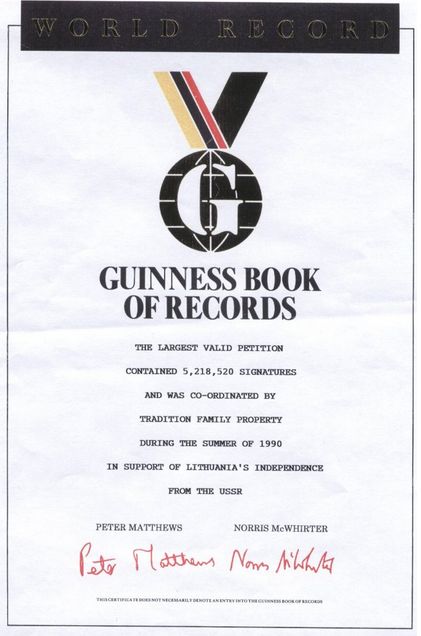|
Plinio Corrêa de Oliveira
TFPs Undertake Victorious Crusade in Favor of Free Lithuania
“TFP on Lithuania”, June 1991, The American society for the Defense of Tradition, Family and Property (TFP) |
|
|
Commentary In March of last year, when growing tension between the Soviet Union and Lithuania had reached a point clearly conducive to conflict, one might have asked what was the importance of the Soviet aggression which occurred at that time. The answer: None. This, because there had already been serious conflicts in other regions of the USSR, such as Georgia and Azerbaijan, that the Kremlin had brutally suppressed. These are small nations which, like all peoples, have the natural right to their own independence. They longed to escape from the colonization and fauces of a regime imposed on them by foreigners without any link to their national thought, history, or traditions, a regime that, furthermore, afflicted all of them with frightful misery. Therefore, nothing could be more agreeable than the independence of these small nations. The world witnessed the Soviet intervention in all of these regions with displeasure, but, nevertheless, the repression was completed and to this day the Soviet boot continues to subject these nations to humiliating oppression. When Soviet intervention occurred in Lithuania, one might have expected the same events that happened in other regions, given the similarity of circumstances. However, this time something diametrically opposite happened: The whole world became deeply interested in the situation created in that Baltic country despite the fact that the news media made no special effort to excite public opinion against the Soviet government.
But the TFPs and TFP Bureaus, in 20 countries, knew how to sense the spontaneous, natural, and authentic indignation of world opinion, an indignation that had not been artificially roused by the media nor anyone else. The TFPs caught this so strongly that they ventured an enormous step: the promotion of a petition drive that, if its results were meager, would be harmful to Lithuania itself. The drive brought colossal results. But why did the Lithuanian case rouse so much more attention than other analogous cases? Because it happened at a moment when the clamor of Lithuania was added to another clamor—so weak it seemed dead, yet living on in the memory of all—the lamentation of the nations previously crushed by the Soviets. Has another nation been crushed? And now another? And now three more? Nations to which we are linked by the common embrace of Western civilization, which recognizes the right of each people to live its own life? How is not possible to become indignant upon seeing such nations slaughtered by brutal Soviet aggression? Seeing all this gave rise to a desire to say "enough!" to Moscow, a desire that deservingly grew much in force of impact when the admirable Lithuanian resistance demonstrated acts of faith and bravery that astonished today's vile and utilitarian world. The result of this desire was the monumental petition drive promoted by the TFPs that gathered 5.2 million signatures in 26 countries. Everyone sensed that a message was being sent to the Kremlin: "This time we want you to know that there are people in the West who cry out: Stop! Stop, because we no longer want to watch with our arms crossed!" This explains the solidarity with Lithuania of all the signatories. In Brazil and other nations where the petition drive was held, this solidarity was accentuated by the fact that Lithuania is a Catholic nation. Lithuania was first constituted as a Christian kingdom in the remote year of 1250 when King Mindaugas embraced the Faith and received the royal crown from Pope Innocent IV. In 1322, King Gediminas strongly supported the Franciscan missionaries among his people. Grand Duke Jagiello was betrothed to the heiress of the throne of Catholic Poland in 1386, and, in the following year, he became the king of a political union of these two nations, a union that further favored the Christianization of Lithuania. Lithuania attained its political apex during the reign of Grand Duke Vytautas (1392-1430). He extended the borders of his nation from the Baltic Sea to the Black Sea and held in check the Tartar hordes that threatened to invade Europe. At the Council of Constance (1415), Vytautas the Great was elected commander of all the Christian armies against the Turkish invasion. Thus Catholicism, although late in reaching Lithuania, was consolidated. The long period of peace during the reign of Casimir IV, Grand Duke of Lithuania (1440-1492), is attributed to this. His son Casimir (died in Vilnius in 1484) is inscribed by the Church in the list of saints as patron of Lithuania. The petition of the TFPs is a warning to the Soviets and Gorbachev: "Don't think you are going to fool us any longer with your machinations exhibiting false moderate tendencies when nations have been crushed like Azerbaijan and Georgia, and as three more are now beginning to bleed and die in your hands. Enough! We are disgusted! Gorbachev, Soviets! We want you to know that the voice of the TFPs is an echo of the universal disgust that cries out: `That's enough.' " This cry is also meant for the governments whose foreign ministries have so often ignored the wishes of public opinion regarding international politics. These governments know that among the motives of their popularity or unpopularity will be what they do in face of the Lithuanian case. And the TFPs propose to follow this case and notify people in the countries where the petition drive was promoted (and, eventually, in other countries as well) about the developments of Soviet aggression. This will be done in such a manner that if Lithuania—and Latvia and Estonia as well—reach the point of effectively losing their independence, there will be even greater universal clamor that will inflict a greater loss on communism than the relative profit that Gorbachev hopes to obtain by sacrificing these three innocent victims.
|
|



